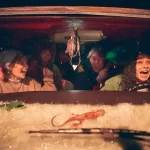TCM Classic Film Festival 2018: Part One, by David Bax
Each year, the TCM Classic Film Festival is organized around a loose theme. From movies about travel to retellings of historical events to comedies, the films are generally curated to fit into a pre-established category. Wisely, though, the programmers aren’t overly beholden to their own guidelines. Maybe you don’t like historical epics. That’s fine, you can also have a full festival without seeing any of the themed films. That was especially true this year as the theme–Powerful Words: The Page Onscreen–was so nebulously defined that I couldn’t even tell you for sure how many of the wonderful films I saw were a part of it. That doesn’t matter, though, because what I can tell you is the festival remains something unique (even if the theme doesn’t), a magically transportive long weekend in the Spring in which watching the movies is as much fun as spending time around the kinds of people who love them.
But this is a movie website, not a diary, so I’ll stick to writing about the films. My opening night selection was a first for me in more ways than one. It was a new film to me; all of the movies I saw at this year’s festival were. But it was also the first time I’d attended one of TCM Fest’s poolside screenings at the Roosevelt Hotel, a lovely throwback oasis in the middle of Hollywood. So I sat back on a too-chilly evening with a too-expensive drink (but plenty of free food!) to watch Gordon Douglas’ Them! (1954), the leader of the pack when it comes to 1950s giant bug movies. If you’re like me and your only reference point for this movie is Mant!, the parodic film-within-a-film from Joe Dante’s Matinee, then you’ll be as surprised as I was to find that Them! is a maturely paced, carefully made, high concept horror thriller. The first half or so, set in the New Mexico desert, is especially creepy, teasing the reveal of the giant ants by first introducing us to the carnage they’ve left behind and the psychological damage they’ve done to those who have survived it. From there, we get other delights, like the egg-filled chamber of a queen (25 years before Alien) and a pre-Davy Crockett Fess Parker as an Air Force pilot in a psych ward who’s hopping mad that everyone thinks he’s barking mad for saying he saw a flying ant and could someone at least get him something to wear other than these hospital pajamas? When the action relocates to the big city, Them! becomes a bit more of the cornfest you may have been expecting, with the ants apparently taking two young boys hostage or something in the sewer system. But at least we get to see people drive cars in the L.A. River, which is always fun. Cheesy as the finale is, I can think of no better testament to the movie’s effectiveness than to tell you that, at one point while sitting on the Roosevelt’s poolside patio, I was startled by what I thought was a large bug at my feet but turned out to have been a grape someone dropped from their plate of passed hors d’oeuvres.
Sticking with the 1950s, I next saw Frank Tashlin’s anarchic 1957 anti-romance Will Success Spoil Rock Hunter? Even a disappointingly soft and muted DCP couldn’t tame the spirit of this madcap movie. In regards to the festival’s theme and proof of the writer/director’s irrefutable will, Tashlin’s adaptation famously has almost nothing to do with the play it’s based on. Instead, this pre-Notting Hill tale of a low level adman (Tony Randall) dragged into a fake relationship for the cameras with a sultry movie star (Jayne Mansfield) becomes a playground for Tashlin to run wild in, tossing out hilarious send-ups of American consumerism and success as defined by wealth and fame as he goes. The most memorable of these is a mid-movie break to accommodate viewers accustomed to television and its commercial interruptions, during which the frame is reduced to a tiny box with a rolling picture.
Such shenanigans made for an awkward pairing with my next selection, 1943’s bleak-as-can-be Western lynching drama The Ox-Bow Incident, one of three William A. Wellman films playing the festival this year. Henry Fonda and Harry Morgan play two cowpokes who are unfortunate enough to happen to roll into town on the same morning a local farmer is shot. Despite their moral qualms, the two decide to ride along with the lynch mob in order to keep from inviting suspicion that they could be the killers and end up meeting the wrong end of the rope themselves. The party comes across three men, led by a young farmer (Dana Andrews). Circumstantial evidence suggests their guilt but–the peskiest thing–they keep insisting, convincingly, on their innocence. What follows bears some resemblance to the kind of heated debate in which Fonda would engage fourteen years later in 12 Angry Men. But, mostly, The Ox-Bow Incident is a damnation of mob mentality and the ability of a sentiment, once agreed upon by enough people, to override reason. It doesn’t help that the mob is made up entirely of men, save for one willful woman (Jane Darwell). Accusations of weakness, both spoken and unspoken, arise immediately when any one of them expresses reservations. “Toxic masculinity” may be a phrase recently coined but the phenomenon it describes isn’t. The movie ends with some Code-dictated suggestions that those who behaved immorally will face punishment. But Wellman doesn’t want you to take any pleasure in that. It’s just the next step in the cycle of human cruelty and misery.
Okay, so who’s ready for another comedy? The screening of 1940’s This Thing Called Love, directed by Alexander Hall, was introduced by Illeana Douglas, whose grandfather, Melvyn Douglas, stars alongside Rosalind Russell in this sex farce with a high-concept, low-sense premise that, luckily, only exists to engineer a series of madcap set-pieces. The two play a soon to be married couple who, refreshingly, both intend to keep their jobs after the wedding without there being any grief or argument about it. This is two years before Woman of the Year, where Spencer Tracy’s ego couldn’t handle a wife with a successful career and the movie agreed with him, casting her ultimate willingness to sacrifice her happiness for his and embrace traditional domesticity as a kind of growth. That also played at the festival this year but I didn’t watch it for the reasons I’ve just outlined. No, in this case, Russell’s Ann is conducting social research and has decided, without first consulting Douglas’ Tice, that her marriage will be the first case study. What that means, although the movie never states it explicitly, is that they will continue to refrain from sex of any sort for the first three months of their marriage. Tice isn’t happy about the arrangement and so he sets himself the task of seducing Ann out of her own convictions. Like I said, it’s a pretty stupid premise—so much of Ann’s argument is about not bringing children into a doomed marriage that I wanted to shout a reminder about the existence of condoms—but the results are undeniable. It helps that Douglas and Russell have such strong chemistry that you can even feel it when they’re talking over the phone from different countries in the charming opening scene. It also helps that they have cute dogs that are good for an occasional cutaway. Of course, it’s not all puppies and pillow talk. In case you were worried, there’s also some casually racist stuff about Tice’s travels in South America, including a statue of supposed fertility god Quetzalcoatl that bears no resemblance to the Aztec feathered serpent deity who, by the way, wasn’t a god of that kind of fertility anyway (mostly associated with wind and air, he is only sometimes discussed in terms of agricultural bounty). But, back to the topic at hand; This Thing Called Love is a compound farce made up of multiple little farces. First there’s the dinner party, with Lee J. Cobb as a Peruvian banking magnate who will only invest in Tice’s ventures if the new couple is going to have children, leading Tice to lie that they are and then try to keep Ann from learning that he’s done so. Then there’s Tice’s innocent midnight swim with his lawyer’s mistress (played by the hilarious and lovely Binnie Barnes). And then there’s the bit with the poison oak. Structurally, it’s all a bit unwieldly but it’s held together by a kind of centrifugal force created by Hall’s propulsive direction and the contributions of this energetic cast, which also includes Allyn Joslyn as the aforementioned lawyer and Gloria Dickson as his ferocious jilted wife.
































